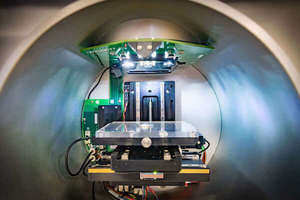
Nine doctoral students from the University of Notre Dame have received Center for Environmental Science and Technology (CEST) Predoctoral Research Fellowships. The CEST program promotes interdisciplinary education and innovation by providing students with a semester-long fellowship in any area of environmental science or engineering.
“Once again, CEST is grateful to support student research at the forefront of many global challenges,” said Jeremy Fein, professor of civil & environmental engineering & Earth sciences (CEEES) and director of CEST. “After a tumultuous year, I am especially looking forward to seeing how the students will utilize our center’s equipment and their new research funding to improve our world through their timely and topical work, including energy, environmental science, and global health-related research areas.”
The 2021 CEST Predoctoral Research Fellows are:
- Bumjun Park, doctoral student in chemical and biomolecular engineering, to research vertically aligned 3D lithium metal anode host configurations with advisor Jennifer Schaefer, assistant professor of chemical and biomolecular engineering.
- Peng He, doctoral student in chemical and biomolecular engineering, to study poly(tetrahydrofuran)-based single-ion conducting polymer electrolytes for rechargeable batteries with Schaefer.
- Justin Greaves, doctoral student in CEEES, to research virus-particle association in sewage with advisor Kyle Bibby, associate professor of CEEES and Wanzek Collegiate Chair.
- Michael Dugas, doctoral student chemical and biomolecular engineering, to research the fabrication of organic solvent-stable copolymer membranes for energy-efficient and environmentally responsible pharmaceutical separations with advisor William Phillip, associate professor of chemical and biomolecular engineering.
- Tsuyoshi Kohlgruber, doctoral student in CEEES, to study U60-mineral surface interactions with advisor Peter C. Burns, Henry Massman Professor of CEEES, professor of chemistry and biochemistry, and director of ND Energy.
- Mengfei Li, doctoral student in CEEES, to study mechanical properties of biofilms for strategic biofilm control with advisor Robert Nerenberg, professor of CEEES.
- Whitney Conard, doctoral student in biological sciences, to research per- and polyfluoroalkyl substances (PFAS) in the Lake Michigan food web with advisor Gary Lamberti, professor of biological sciences.
- Jeffrey Dubose, doctoral student in chemistry and biochemistry, to study the stabilization of the surface of perovskite nanoplatelets for photocatalysis with advisor Prashant Kamat, Rev. John A. Zahm Professor of Science.
- Ceara Talbot, doctoral student in biological sciences, to research lateral carbon transport in ecosystems with advisor Stuart Jones, associate professor of biological sciences and associate director of research at the Environmental Research Center (UNDERC).
The selected applicants for the CEST Predoctoral Research Fellowship program are typically announced at the end of the Spring semester. To learn more about fellowship eligibility and application review criteria, please visit https://cest.nd.edu/fellowships/.
The Center for Environmental Science and Technology fosters interdisciplinary environmental research and education by providing cutting-edge analytical technologies needed to address national and international problems. CEST supports interdisciplinary environmental education, research, and stewardship through a variety of education and outreach activities.
To learn more about the center, please visit https://cest.nd.edu.
Contact:
Joanne D. Fahey
Director of Research Communications
Notre Dame Research / University of Notre Dame
fahey.17@nd.edu / 574.631.9762
research.nd.edu / @UNDResearch
About Notre Dame Research:
The University of Notre Dame is a private research and teaching university inspired by its Catholic mission. Located in South Bend, Indiana, its researchers are advancing human understanding through research, scholarship, education, and creative endeavor in order to be a repository for knowledge and a powerful means for doing good in the world. For more information, please see research.nd.edu or @UNDResearch.